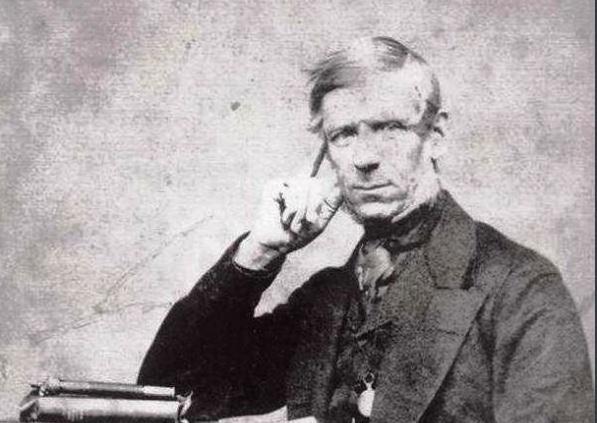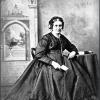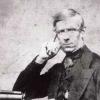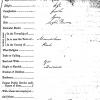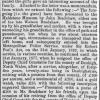IN LOVING MEMORY OF JOHN BRADSHAW, LATE D.C.C. OF DENBIGHSHIRE DIED DEC 4, 1886. ALSO ELIZABETH BRADSHAW, WIDOW OF THE ABOVE DIED JUNE 3, 1900. John Bradshaw was baptised on 13 September 1809 in All Saints Parish, Maidstone, Kent. He was the son of Watson Bradshaw a carpenter, his mother was Ann Cook. On 31 January 1832 John joined the Metropolitan Police Force, Warrant no 8160, Unit 126. In 1837 he was on duty when Queen Victoria attended Lord Mayor's city banquet, and at Palace Yard for expected Chartist meeting. (Police Records) By 1841 John was in Manningtree, Essex, he was a police superintendant, also there was 25 year old Mary Bradshaw and John (Watson) Bradshaw aged 3. No relationships are given. In 1844 he joined the Northamptonshire police and on 5 August 1844 John married Elizabeth Letts in Wardington, Oxfordshire. He was a policeman and a bachelor. Elizabeth was a spinster; her father was named as William Letts, a farmer. She had been baptised on 7 July 1823 in Sulgrave where she was born. Her mother was Ann Malsbury. In 1846 while he was still in Northamptonshire, John was forced to hand in his resignation 'by order' for bringing accusation against Mr Weston, clerk, for misappropriating expense money. In 1848 he joined the Denbighshire police force and was based in Llanwrst. His police records show he was 30, with light brown hair and grey eyes. After the reorganisation of the force John was relocated to Vale St, Denbigh. In the 1851 census he was the superintendant of police and was living at Tanygraig, Llanwrst, there were 3 young children, and also a 13 year old son John Watson Bradshaw born in Greenwich who must have been from an earlier “marriage. In December 1852 John made a complaint to the magistrates about Isaac Simon a printer and publisher who had charged for double the quantity of blank stationary supplied to the police. Isaac was cautioned by the magistrates and told to be more careful or he would lose the printing. Isaac was extremely put out by this and did a lot of digging into John`s past in order to defame his character, and sent a number of letters to the newspapers intending to ruin John`s career. 20 May 1853 North Wales Chronicle. (Edited) COURT OF QUEEN'S BENCH. Mr M. Chambers, Q.C., and Mr Joyce appeared tor the plaintiff; John Bradshaw, and Mr. J. Brown for the defendant Isaac Simon, a stationer who was the publisher and proprietor of the Denbigh, Ruthin and Vale of Clwyd Advertiser. The action was brought to recover damages for a series of libels , reflecting on the character of the plaintiff (John) the Superintendent of Police , Denbigh, having previously been in the police in Essex and afterwards in Northampton. Isaac stated that he felt called upon to publish a letter from the chief constable of Northamptonshire in consequence of himself of having fallen to the malevolent, and unfounded information of the plaintiff. This stated that John had resigned by order but was not removed from the force. In another article Isaac called John the “Northampton blue bottle” and insinuated that officers who had been discharged for lying, slandering and adultery had somehow obtained good characters and been able to be moved into fresh situations, and that he (Isaac) would do all he could to get him out of Denbigh, as he was nothing but an impostor. It was proved that years ago John had been dismissed by the Essex police for living with a woman he had not married. None of this had made any difference and John was given the verdict and damages of £25. By January 1860 John was in Wrexham where the birth of a daughter was announced. He was also the Weights and Measures Inspector and a notice was published the same month. “During year 1860, I, John Bradshaw, Inspector of Weights and Measures for the A District, will attend my Office, Bryn Castle, 1st Tues of month10 to 4, for W and M attesting. “ Bryn Castle was a large property in Penybryn. In 1854 Bryn Castle, Pen-Y-Bryn, Wrexham. To Be Let, with possession all that comfortable and respectable residence called Bryn Castle," situate in that healthy and salubrious part of the town called Pen-y-bryn, in the Township of Wrexham-Abbot, and within 15 minutes’ walk from the Wrexham Station .The House comprises good dry cellaring, kitchen, larder, pantry, breakfast, dining and drawing-room also several good bedrooms. Attached is a yard with wash-house, pump, stabling and other conveniences. Also, a garden stocked with Fruit trees and from which there is a magnificent view of the ancient Hills of Cambria. For further particulars apply to the owner, Mr. James Edisbury, Bersham, In 1859 there was an article regarding new drains in the town. This gives a good idea of where the house was. “Drains crossing Belle-vue road, skirting the bank at the back of Pentrefelin Castle, Tenter school, Bridewell Bryn-castle and the Swan.” March 1877. To let with immediate possession, Bryn Castle, Penybryn, with Coach House, Stable, and large Garden attached, now in the occupation of Mr Bradshaw D.C.C It`s possible that Bryn Castle was used as police accommodation as in 1878 it was announced that on Dec. 15th, at Bryn Castle, the wife of Superintendent Wilde, had given birth to a son. John was at 30 Penybryn (Bryn Castle) in 1861 with Elizabeth and their children - William E 15, Urban Rufus 12, Llewellyn 10, Henry E 5, Thomas F 3 and Elizabeth A just 1 year old. His sister in law Ann Letts was visiting. They were still there in 1871 and now had 2 more children Wilfred 9 and Miriam aged 7. In January 1877 John retired. There was a very long article in the Wrexham Advertiser about his career. PRESENTATION TO DEPUTY CHIEF CONSTABLE BRADSHAW. On Wednesday last, Mr D.C.C. Bradshaw retired from the office of Deputy Chief Constable for the County of Denbigh, after forty-five years arduous and faithful service. In addition to the purse of £200, the presentation took the form of a splendid gold watch, value £25, which was supplied by Mr Heywood, watchmaker of High Street, and bore on the inner case the following neatly engraved inscription: Presented to Mr Bradshaw by his friends, on the occasion of his retiring from the office of Deputy Chief Constable for the County of Denbigh, January 31st, 1877, being his 45th anniversary in the Police Service. With regard to Mr Bradshaw's early history in connection with the police service, it may not be out of place, nor uninteresting, to record that when he first joined the ranks, a tall, upright young man he was one of the Metropolitan Police Service who were first called out for special duty on the first occasion of William and Adelaide appearing in public after their accession to the throne, which was at a review of the Household Troops in Hyde Park. He was also on duty when William and Adelaide visited Greenwich Hospital, and when Queen Victoria attended the city banquet given by the Lord Mayor of London after her accession to the throne of England; we find Mr Bradshaw again on duty at Woolwich when Prince Albert inspected the Royal Arsenal. The last 20 years of his life had, as they knew, been spent in the midst of them in Wrexham. Mr Bradshaw bad, in fact, becomes a sort of "institution," and one who would be greatly missed by them all. On 5 February 1878 Johns eldest daughter Elizabeth married Edward Eyland Rogers at St Giles. Edward Eyland went on to be founder member of Rogers and Jacksons Ltd., with John Edgar Jackson. John and Elizabeth moved to Park View, which was near Holt Street, only Wilfred and Miriam were with them. Wrexham Advertiser 25 October 1884. John wrote a testimonial about a “lung Invigorator” device. PUBLIC HALL. WREXHAM. MAGNETISM and HEALTH. THE MOST SUCCESSFUL CURATIVE REMEDY OF THE AGE. PLAYER AND RETALLACK'S ELECTRICAL APPLIANCES. FOR THE CURE, RELIEF. AND PREVENTION OF DISEASES. RECOMMENDED BY THE MOST EMINENT PHYSICIANS. In consequence of the many enquiries and his great success in Wrexham and the neighbouring town"" MR. RETALLACK. M.E. Has arranged to continue his visit to Wrexham for a short time longer, and he may be consulted daily, free of charge. at his private consulting rooms, Public Hall, Wrexham Where he will give advice as to the application of Curative Magnetism and explain the principles of his Magnetic Appliances, of which he has a large assortment suitable for every part of the body. BRONCHITIS AND ASTHMA. Park View, Holt-road, Wrexham, September 12th, 1884. My Dear Sir,—It is with much pleasure I have to inform you that I have worn your Lung Invigorator for about six weeks. I am 75 years of age, and for the last fifteen years have suffered very much from a tight and weak chest with great spasmodic sensations. The paroxysms at times have caused great anxiety. The cough and expectoration having very considerably diminished, I am much stronger and my appetite is a great deal better. You are at liberty to make use of this in whatever way you may deem desirable.—I am dear sir, yours very faithfully, JOHN BRADSHAW, Ex-Deputy-Chief Constable for Denbighshire. John died on 4 December 1886 at his home. THE LATE MR. JOHN BRADSHAW.-We record this week the death of Mr. J. Bradshaw, Park View: who for a number of years acted as Deputy Chief Constable in this county. The deceased gentleman expired on Saturday week in the 77th year of his age. Mr. Bradshaw was a native of Kent, and his family was connected for many generations with the Moat Park estate in that county, the seat of the Earl of Romney. In 1883 he presented a number of guns to the Maidstone Museum, all of which were of remote antiquity. The letter which accompanied the gifts gave an interesting account of the family. Attached to the letter was a memorandum, from which we extract the following -" The foregoing (i.e. the guns) have been presented to the Maidstone Museum by John Bradshaw, eldest son of the late Watson Bradshaw. He was brought up by his grandfather and mother, with a view of succeeding his grandfather in the office of park and gamekeeper, but when he was about nineteen years of age, circumstances so transpired that he left home, and subsequently entered into the Metropolitan Police Service, under Sir Robert Peel's Act, on the 31st January, 1832, in which service, in various counties, he continued until the 31st January, 1877, when he resigned the office of Deputy Chief Constable for the county of Denbigh, North Wales, after a service, altogether, of forty five years, twenty nine being in Denbighshire, retiring with a pension from that county, of £ 100 per annum, and a testimonial of £200, and a gold watch, value of £ 25, with the following inscription engraved thereon. Presented with a purse of £ 200 to Mr. Bradshaw by his friends, upon the occasion of his retiring from the office of Deputy Chief Constable for the county of Denbigh, January 31st, 1877, being the 45th anniversary in the police service." During the period of his official connection with this county, he gained the respect and confidence of all the senior magistrates, as well as that of the general public, by his firmness and straight-forward manly character and conduct, and many will hear of his death with great regret. The funeral of the deceased gentleman took place on Wednesday, Dec. 8th, at the New Cemetery, where the Rev. Canon Howell officiated. Elizabeth and Miriam moved to Lower Coyty, Glamorganshire by 1891, in 1885 Wilfred had married Mary Emily Phillips and was also living there. Wilfred and his family moved to Bridgend and Elizabeth died at his home on 3 June 1890. Elizabeth was brought back to Wrexham and buried with John. Researched by Annette Edwards. Many thanks to Deborah Smith for the photos and documents. April 2019. Grave ref: J-02748
Story added by Graham L
Mynwent Wrecsam
Hanes lleol

